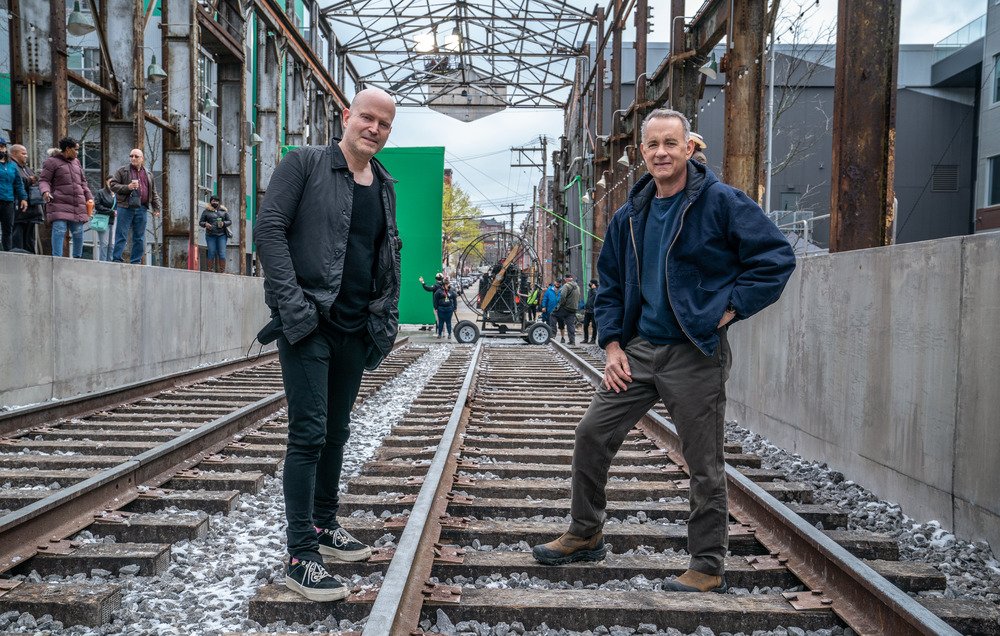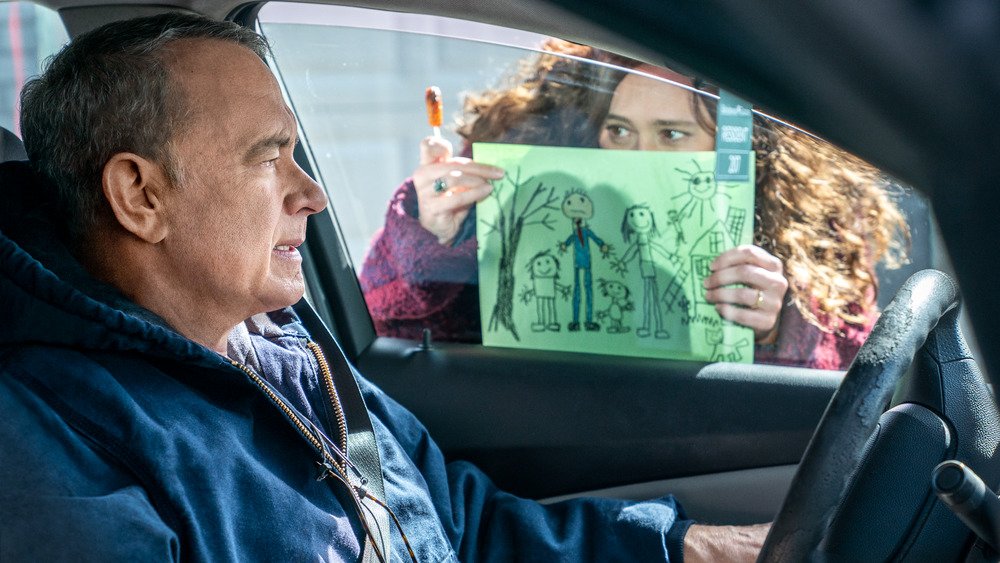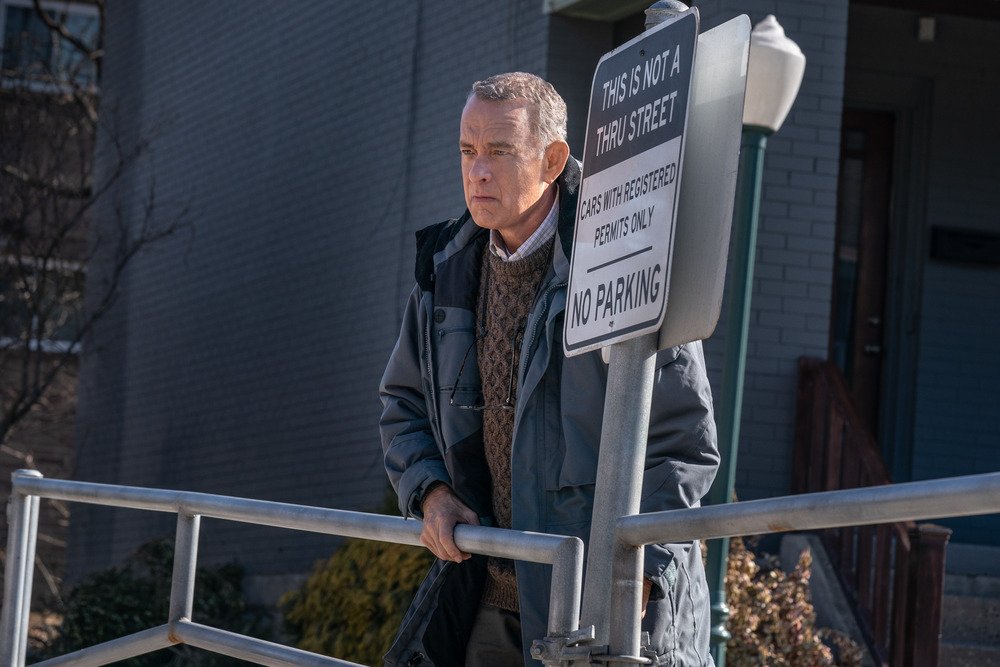MOVIE REVIEW: A Man Called Otto
A MAN CALLED OTTO— 4 STARS
An argument can be made that Tom Hanks is wrong for the title role in A Man Called Otto. Sure, he’s the right age at 66, and his hair has gone nicely gray. It’s more the notion that Tom Hanks has been anointed as “America’s Dad” by Esquire magazine a few years ago, a distinction he has been willing to embrace (and lampoon a little on the side) with acting roles that capitalize on his sagacity and stature. Frankly, these dependable traits of Tom Hanks have become old hat to the point where he does not seem very challenged.
LESSON #1: THE CHALLENGE IN TURNING A GOOD GUY BAD– A Man Called Otto asks Tom Hanks to play an ill-tempered sourpuss senior. On paper, that counts a new wrinkle and challenge for Hanks, yet, “America’s Dad” is living and breathing underneath the character creation. We know with too much comfort and confidence that the charming side is ready and waiting to emerge at any moment. Unlike tough guy Humphrey Bogart surprising folks as a romantic lead in Casablanca, it’s harder to go in the other direction and get a default nice guy to play mean.
Yet, we forget about Tom Hanks, “America’s Accomplished Actor.” We forget the two-time Oscar winner wears that very shiny sash as well. When committed, and it’s hard to cite a movie or role where he isn’t (even to counter his own reflection that only four of his films are any good), he can convince us of any emotion, behavior, portrayal, or story arc. Hanks pulls off that kind of magic with A Man Called Otto for Finding Neverland and World War Z director Marc Foster. We root for the charmer, even when we know the charmer is there inside of something repulsive.
A Man Called Otto leaps right into the ugly traits there to mute the actor’s appeal. Otto Anderson (Hanks) is introduced with a pushy argument over a few cents and principles at a local hardware store trying to buy rope, showing you the kind of spite carried by this man. By the time we see Otto back at home, he’s the gruff old bastard “making his rounds” acting as the de facto head of the homeowners association to an enclave of row houses in Duquesne, Pennsylvania outside of Pittsburgh. He carries himself with low patience, pushy entitlement, and a complete ambivalence to courtesy. Otto will even scowl and growl at the snow he pushes with his shovel.
The muddying darkness gets deeper quickly in that the rope Otto purchased has been tied into a noose and affixed to his living room ceiling. The determined reservation of an unhappy man seeking to end his own life is clear, from his plan of closing his home’s utilities accounts to readying his best suit for the occasion. Right as he’s about to commit the act, two types of distractions arrive to make Otto, as a supporting character will remark later, “really bad at dying.”
LESSON #2: YOUR LIFE FLASHING BEFORE YOUR EYES– The first is the proverbial “life flashing before your eyes” moment of euphoria. The flickering images, edited by Matt Chessé (Warrior) and shot by cinematographer Matthias Koenigswieser (Christopher Robin), clue the viewer into Otto’s younger life (played by Tom’s son Truman Hanks in his film debut) and his status as a widower. His late wife Sonya (Rachel Keller of Legion and Fargo) is every bit in that house and in Otto’s blackened heart, which is, coincidentally, an enlarged one that kept him out of military service and will eventually be his natural death sentence. The rush of it all gives him, and us, pause.
LESSON #3: FATE COMING INTO PLAY– The second bit of happenstance comes from a combination of unintentional failure and unseen interruption. Some piece of the preparation fails or Otto, a stickler for the rules, will see some little scene of disorder or buffoonery from the tenants and feel compelled to stop what he’s doing and address it. The chief sources of this kind of nuisance in A Man Called Otto become a stray cat who’s always in the right place at the right time and his new neighbors– the pregnant and very direct immigrant Marisol (TV actress Mariana Treviño), her equally non-savvy husband, and two daughters.
A Man From Otto is adapted nearly beat-for-beat from Hannes Holm’s well-regarded and Oscar-nominated 2015 Swedish film A Man Called Ove and Fredrick Backman’s source novel. Similar subplots and character shadings involving perky neighbors, immigration slander, healed homophobia, and car brand disputes populate the Americanization. This script may have been an easy lift for screenwriter David Magee, one of Hollywood’s top literary safecrackers (Life of Pi, Finding Neverland, Lady Chatterley’s Lover), but it still took gentle care to present correctly. That’s where Forster kept things muted and tender, right on down to Thomas Newman’s noodly-doodly little score (long his wheelhouse vibe). Any rants happen at a normal volume and without a stage spotlight of over-amplification.
LESSON #4: THE MAN BEHIND THE PAIN– Before long in A Man Called Otto, there’s a disarming dual narrative in play. Recollections show Sonya, a personable and open-minded school teacher, properly courted by the younger and softer Otto. Years later, neither the cat nor Marisol shudder at Otto’s brusque demeanor. Each companion becomes the perfect agent for wearing down Otto’s shell of unfriendliness. Slowly but surely, the interactions in two timelines shed light on his strict tendencies and the past pain that caused his peccadillos. More often than not, what is revealed is devastating enough to turn on the water works residing in your eyelids.
While Truman Hanks comports himself very well in his first feature, the chief credit for those heartfelt reactions in A Man Called Otto belongs to Tom Hanks and Mariana Treviño. Her character’s resistance and insistence is the pushback this film version needed to avoid being a one-sided gripe-fest. Any performer who can earn one or two moments over an icon like Tom deserves praise. The attitude shifts of their conversations and exchanges are superb.
Nevertheless, all the drama and comedy swirling together in Forster’s film empties into Tom Hanks. On different shoulders, A Man Called Otto is pure cinematic molasses, but Hanks is a sentimental soothsayer overcoming irony and doubt. He’s a special actor who can transform the trite and compose the cloying into something substantial, respectable, and endearing. The man melts us again.
LOGO DESIGNED BY MEENTS ILLUSTRATED (#1089)









